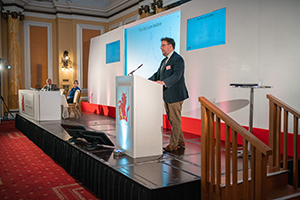Nuffield Farming report explores AgriTech investment decisions
Economics lecturer at Bangor University Dr Edward Thomas Jones NSch has published his Nuffield Farming report ‘Are we making the right investments?’, sponsored by The Royal Welsh Agricultural Society, which explores AgriTech investment decisions.
The full report is now available on the Nuffield Farming report library. A recording of Edward presenting at the Nuffield Farming Conference can be found here.
During his Scholarship, Edward travelled to France, Italy, The Netherlands, the Republic of Ireland, Spain and the USA.
 In his report Edward says: “For AgriTech to be successful in significantly and quickly increasing food production while reducing agriculture’s impact on the planet, investors, entrepreneurs, farmers, and policymakers all need to have a similar and complementary vision for the industry.”
In his report Edward says: “For AgriTech to be successful in significantly and quickly increasing food production while reducing agriculture’s impact on the planet, investors, entrepreneurs, farmers, and policymakers all need to have a similar and complementary vision for the industry.”
He notes that global investment in AgriTech was $15.6 billion in 2023. “Investors are continuing to invest in this sector because it represents a new approach to tackling climate change and the market potential is nearly limitless precisely because our appetites are, too.
“The cost of traditional agriculture is becoming more expensive (when taking into account, for example, climate change, soil health, complex supply chains and water consumption). The $15.6bn of investment needs to have a direct impact on traditional farming methods to help tackle these costs.”
Edward found that alternative metrics, such as ‘return on energy’ or ‘environmental efficiency’, were needed for technology investment decisions in traditional agriculture.
“Such measures will ensure the allocation of finance to support those technologies that will allow farmers to reduce their impact on the planet. The development of such technologies will need to be supported by the government which has the capacity to make investment decisions not based on financial returns alone.
“Traditional agriculture needs to learn and adopt the technologies from farming in controlled environment systems. While it is not possible to control all the elements of traditional agriculture, it is possible to measure each aspect and modify farming practices accordingly,” concludes Edward.
Study objectives
- This study will explore and evaluate the AgriTech vision of investors (the providers of finance), entrepreneurs (those who seek-and-solve), farmers (food producers and users of technology), and policymakers (those who guide and regulate the industry). Are we all heading in the same direction?
Key messages
- The future of AgriTech is likely to be shaped by a wide range of factors, and it is difficult to predict exactly how the industry will evolve over time.
- Technology will continue to play a critical role in the agriculture industry, and AgriTech will continue to be an important source of innovation and growth.
- There are concerns that new technologies will create an unequal power dynamic between farmers and technology providers, with power increasingly consolidated in the hands of the latter.
- Governments needs to ensure that all farmers have the capacity to benefit from AgriTech.
- Log in to post comments

